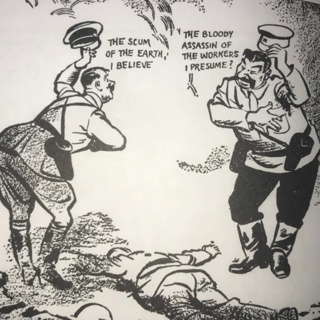Om avsnittet
The Munich Agreement had bought peace. But at a price. The highest had, of course, been paid by Czechoslovakia which lost much of its territory. But there was also a cost in the increasing distrust of the Soviet Union, another of the protecting powers of the Czechs, which had simply been left out of the Munich negotiations, towards the Western Powers. In Britain, though, Chamberlain enjoyed a burst of popularity, as the man who’d preserved the peace. It would be short-lived, however, as the enormity of the betrayal of the Czechs sank in. And after the sheer horror of the pogrom across Germany known as Kristallnacht, there was a swing against appeasement and against the government. That became stronger after Germany occupied the rest of Czechoslovakia in March 1939. The invasion in effect tore the Munich Agreement to shreds. Now the pressure for a strong stance against Hitler, and in particular to come to an agreement with the Soviet Union to help, became too powerful for Chamberlain to resist. But the British conducted negotiations with the Soviet Union in such a casual way, so dismissively of the Soviets, that failure was unavoidable. Within days of the collapse of the negotiations, the Soviet Union announced that it had signed a Non-Aggression Pact with the Nazi Germany. This was one of the most shameful international agreements ever signed. But Britain’s stance had contributed to it. What’s worse, the pact, the second biggest shock of 1939, would lead within a week to the biggest of all. Which we’ll tackle, appropriately, in a week’s time. Illustration: David Low, ‘Rendez-vous’. Music: Bach Partita #2c by J Bu licensed under an Attribution-NonCommercial-No Derivatives (aka Music Sharing) 3.0 International License
